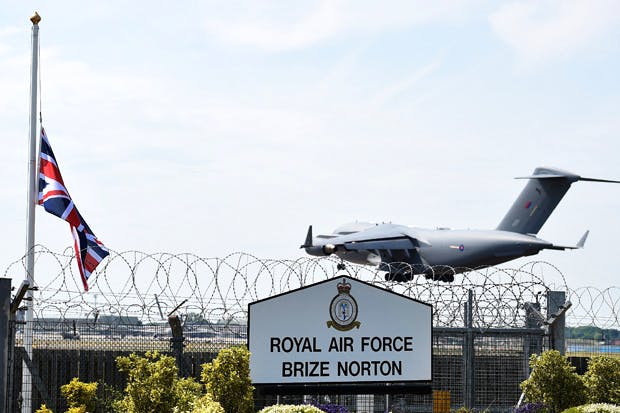“Whether it’s in Iraq, Syria, Libya or elsewhere — as Prime Minister, if I believe there is a specific threat to the British people, would I be prepared to authorise action to neutralise that threat? Yes, I would.”
It is almost two years since David Cameron lost a vote on intervening in the Syrian war and he has barely spoken about foreign affairs since. He is now slowly returning to the subject, making the case for pursuing Islamic State in Syria. The recent murder of 30 British holidaymakers in Tunisia was almost certainly planned in Isis’s Syrian stronghold of Raqqa. The Prime Minister is making the fairly simple case that the military ought to be able to pursue the enemy.
But there is no chance of the RAF ‘neutralising’ the threat. For all his interventionist instincts, the Prime Minister has spent five years imposing deep cuts on the armed forces; by some estimates, he has reduced the UK fighting capability by up to a third.
This week, we learnt that the RAF’s fleet of fighter aircraft is to shrink to its smallest in history. Gen Sir Nick Houghton, the Chief of the Defence Staff, has warned that the RAF is ‘at the very limits of fast-jet availability and capacity’. It’s odd that the Prime Minister is so eager to join the Americans in bombing the Syrian side of the border when Britain has been able to make so little difference in northern Iraq.
The RAF is able to spare just eight Tornados, themselves two years away from being in a museum, and a generation behind the American F-22s they fly beside. Only two can fly at any one time, dropping only 5 per cent of the bombs. Britain’s impact has been welcome, but marginal. We should not pretend that our presence in Syria would be any less marginal.
Cameron cannot blame parliament: our weakness is due to the decisions that he has taken, which our allies have watched with dismay. As the American magazine Foreign Policy pointed out recently, Britain is shrinking its army to the same size as the New York police department. We bloat the foreign aid budget and reduce the Foreign Office budget by a fifth. We lay off Gurkhas while doubling handouts to Nepal. This week, George Osborne defended the aid budget by saying that he wants to ‘make sure that we are saving lives’.
Aid is good at allowing politicians to make pious statements about their generosity with other people’s money. The aid budget has risen by £3.5 billion under Osborne, while £5.4 billion has been cut from defence. We’re now very good at finding mates for rare Madagascan fish; not so good at helping Kurds fight Isis (so far, we have only managed to spare 40 heavy machine-guns).
The Chancellor has promised not to let military spending slide below 2 per cent of economic output, the Nato minimum. A welcome pledge, but it won’t bring the military (or its capabilities) back to where things were when he took office. Only years of investment could achieve that.
The Prime Minister needs to remember this when making speeches: the RAF is now smaller than the force that was at the disposal of his predecessors. With his spending decisions, he has forfeited the right to talk about ‘closing down ungoverned spaces’ in the Sahara or ‘neutralising’ the threat from Isis. The sad truth is that we no longer have a military strong enough to do so.
Got something to add? Join the discussion and comment below.
Get 10 issues for just $10
Subscribe to The Spectator Australia today for the next 10 magazine issues, plus full online access, for just $10.














Comments
Don't miss out
Join the conversation with other Spectator Australia readers. Subscribe to leave a comment.
SUBSCRIBEAlready a subscriber? Log in